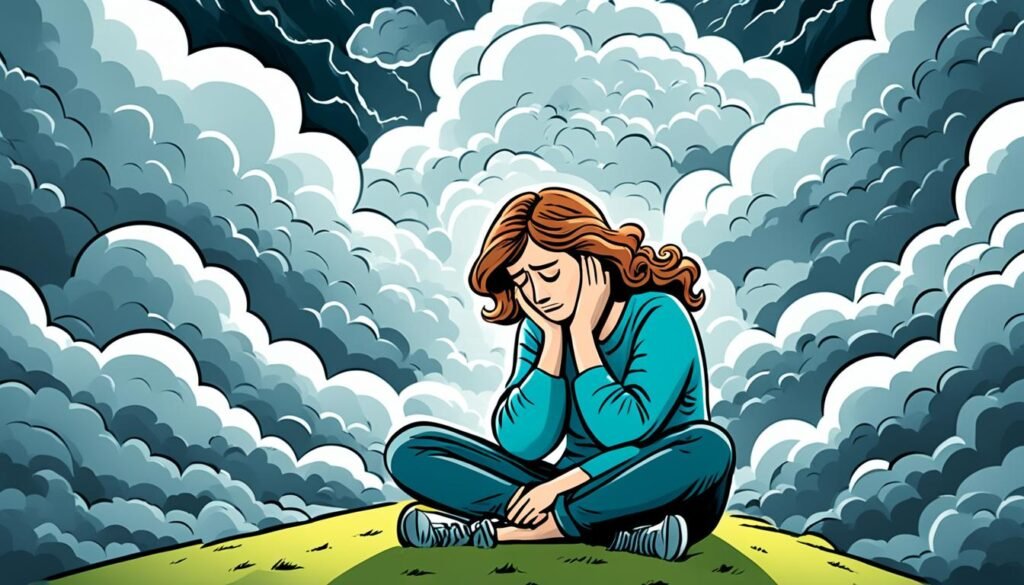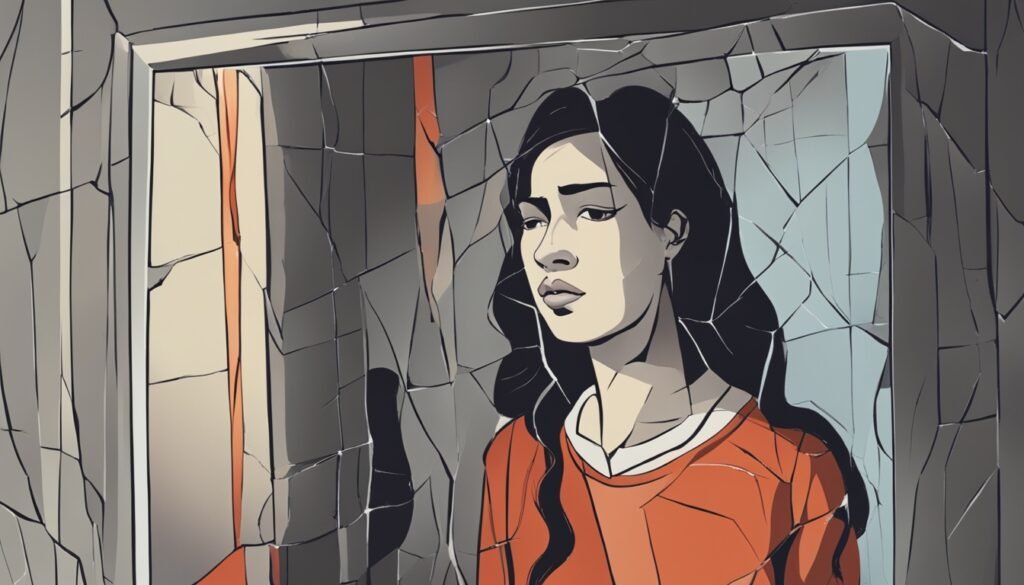Your mental health is key to your overall well-being. Yet, it’s often overlooked, especially for women. Women face unique challenges and are more likely to struggle with mental illness than men. In fact, 1 in 5 women deal with a mental illness, while 1 in 8 men do.
But, your symptoms are often ignored by doctors. You also face big hurdles in getting good mental health care.
This article will look into the main issues and offer insights to help your mental health. We’ll talk about how common mental health problems are in women, the stigma and barriers to getting care, and the mental health challenges you might face.
We’ll also look at gender-specific risks and stressors, cultural views, the effects of discrimination and gender-based violence, and ways to improve mental wellness throughout your life.
By understanding women’s mental health challenges, we can create a supportive environment. This way, you can focus on your mental health and get the support you need. Let’s start this important journey together, exploring mental health in women and finding insights for a healthier future.
Table of Contents
ToggleWomen’s Mental Health: An Overlooked Crisis
Women’s mental health issues are often ignored in our society. Many women suffer from anxiety, depression, and PTSD more than men. This is not just because of biology, but also because of societal pressures and gender discrimination.
Prevalence and Impact of Mental Health Issues in Women
Women are more likely to deal with mental health problems, like clinical depression, at nearly double the rate of men. These issues deeply affect their lives, impacting relationships, work, and overall happiness. Sadly, the stigma around mental illness stops many women from getting help.
Societal Stigma and Barriers to Accessing Care
Many women face big hurdles when trying to get mental health care. Stigma, dismissive doctors, and a lack of services that understand different cultures make it hard. Money issues and other responsibilities also stop women from focusing on their mental health.
We need to tackle the big issues that cause the mental health crisis in women. By removing barriers and fighting stigma, we can help women take control of their health. This will make our society more supportive and inclusive for everyone.
Common Mental Health Challenges Faced by Women
Women’s mental health is a big concern. Anxiety and depression are common among them. Women are almost twice as likely to have these issues as men. This difference can come from hormonal changes, societal pressure, and stress that affects women more.
Anxiety and Depression: Higher Rates Among Women
Anxiety and depression often go hand in hand. Women deal with these conditions a lot. Hormonal changes during the menstrual cycle, pregnancy, and menopause can make mood swings and emotional ups and downs.
Women also face high expectations from society. They have to balance work, family, and home life. This can lead to stress and burnout, making mental health problems worse.
Trauma, Stress, and Post-Traumatic Stress Disorder
Women are more likely to go through traumatic events like gender-based violence, sexual assault, and domestic abuse. These events can lead to PTSD, a serious condition with symptoms like flashbacks and anxiety. The stress and emotional burden women deal with daily can also hurt their mental health.
It’s important to understand the mental health challenges women face. Knowing about these issues helps us offer better support and resources. This can help women feel empowered and improve their mental well-being.
mental health in women
Women’s mental health is complex, influenced by biology, psychology, and society. Many mental health issues affect both men and women. But women often face special challenges that make their mental health worse. It’s important to understand women’s mental health to help them.
Anxiety and depression are big problems for women. They’re more likely to have these conditions. This is due to societal pressures, hormonal changes, and daily stress.
Women are also more likely to have trauma, stress, and PTSD. Things like conflicts, relationship issues, and gender-based violence can cause these problems.
- Women often face stigma and barriers when trying to get mental health help.
- Culture can affect how women see and deal with their mental health, sometimes showing up as physical symptoms.
To help women’s mental wellbeing, we need a wide-ranging approach. This means creating special programs, reducing stigma, and making help easy to get.

Understanding mental health challenges for women helps us help them better. By taking a full approach to their health, we can make their lives better.
Gender-Specific Risk Factors and Stressors
Women face unique challenges that deeply affect their mental health. These include the complexities of relationships, work-life balance, and caregiving. These factors can lead to more stress, anxiety, and depression.
Interpersonal Conflicts and Relationship Dynamics
Women’s mental health is closely linked to their relationships. Dealing with family, romantic partners, and friends can be stressful. Conflicts or power imbalances add to the stress, especially the emotional and social pressures.
Caregiving Responsibilities and Work-Life Balance
Women often carry a heavy load in caregiving, whether it’s for kids, parents, or others. Balancing work, home, and caregiving can cause burnout and overwhelm. This constant juggling is a big stress and anxiety source for many women.
It’s important to support women in these areas to improve their mental health. By understanding their challenges and offering specific help, we can help them manage these issues better. This way, women can focus on their mental health.
Cultural and Ethnic Perspectives on Women’s Mental Health
Women’s mental health is shaped by the cultural norms and beliefs of their communities. In some cultures, mental illness is seen as shameful or a sign of weakness. This can make women hesitant to get help and may cause them to show mental health issues through physical symptoms.
Influence of Cultural Norms and Beliefs
It’s important to understand cultural differences to help women with mental health issues. Some cultures believe mental health problems show personal weakness or divine punishment. This makes it hard for women to talk about their mental health openly.
Traditions and gender roles can also limit women’s freedom and access to help, making mental health issues worse.
Somatization and Manifestation of Mental Health Issues
In many ethnic communities, mental health problems are shown through physical symptoms. Women might say they have headaches, stomach issues, or chronic pain instead of talking about their feelings. This makes it hard for doctors to see and treat the mental health issues.
Healthcare workers need to understand the different cultural views on women’s mental health. This helps them see the unique challenges women from different backgrounds face. It can lead to better mental health care that helps women get the support they need and reduces the stigma around mental health.
The Impact of Discrimination and Gender-Based Violence
Gender discrimination and violence deeply affect women’s mental health. They can make women feel left out, lower their self-esteem, and increase stress. Violence like domestic abuse and sexual assault can cause serious mental health issues. These include post-traumatic stress disorder (PTSD), depression, and anxiety.
It’s vital to tackle these big issues and support survivors fully. We need to give them counseling, housing, childcare, legal help, and job chances. We must also work to end the stigma around mental health and offer support without judgment.
The effects of discrimination and violence on women’s mental health are huge. By tackling these problems, we can help create a fairer and supportive world for women. This will help them do well in both their mental and physical health.

Remember, the harm from gender-based discrimination and violence goes beyond mental health. It can also affect their physical. We must look at how gender, mental health, and physical health connect. This is key to supporting women’s full health and well-being.
Addressing Mental Health Needs Across the Lifespan
Women’s mental health changes as they grow older. It’s key to offer support at important life stages. For example, teenage girls face special mental health issues like anxiety and body image worries.
The time around pregnancy and after childbirth is also crucial for women’s mental health. Many new moms struggle with postpartum depression. It’s vital to help them during these times.
Adolescent Mental Health and Body Image Concerns
Being a teenager can be tough for girls’ mental health. They deal with big changes in their bodies and feelings. Issues like anxiety, depression, and worries about how they look are common.
It’s important to give teens the right help and support. This includes easy-to-use resources and ways to take care of themselves. This can help them stay mentally healthy.
Perinatal Mental Health and Postpartum Depression
The time before and after having a baby is very important for women’s mental health. Many new moms feel postpartum depression. We need to make it okay to talk about these feelings.
It’s crucial to make sure new moms get the help they need. Early support and good care can really help women feel better during this time.
Strategies for Promoting Mental Well-Being in Women
Women’s mental health can be tough to handle, but there are ways to help. By focusing on self-care and managing stress, and building a strong support network, you can get better. These steps can make you feel stronger and healthier.
Importance of Self-Care and Stress Management
Looking after your mental health means putting your needs first. Start with self-care activities that feed your mind, body, and spirit. This includes:
- Practicing mindfulness or meditation to reduce stress and anxiety
- Engaging in regular exercise to boost mood and energy levels
- Ensuring adequate sleep and maintaining a balanced diet
- Exploring creative outlets like art, music, or journaling
Adding these strategies to your daily life can help you cope better and feel better overall.
Building Supportive Communities and Destigmatizing Mental Health
Having a circle of supportive people is key to your mental health journey. Talk to family, friends, or groups to share your feelings and find strength. Also, fighting the stigma around mental health makes it easier for women to get help.
By embracing self-care, managing stress, and valuing community, you can improve your mental health. This approach helps create a supportive space for all women.
Mental Health Resources and Support Services
Women face many mental health challenges. It’s key to have resources and support. These tools help you take control of your well-being and get the help you need.
If you’re dealing with anxiety, depression, trauma, or other mental health issues, there are many mental health resources for women out there. You can find therapy, counseling, support groups, and online communities. These services offer the guidance, understanding, and care you deserve.
Accessing Mental Health Support
Therapy is a crucial support service for women’s mental health. Qualified therapists help you understand your feelings, develop coping strategies, and work towards healing. Many therapists offer affordable, evidence-based, and culturally-responsive care tailored to your needs.
Support groups are also a great resource. They connect you with others who get what you’re going through. This can make you feel less alone and build a sense of community. These groups focus on specific issues like postpartum depression or survivors of abuse.
For those who prefer online options, there are many websites, apps, and virtual communities for women’s mental health. These platforms provide information, self-care tools, and ways to connect with peers and professionals.
Remember, asking for help is a sign of strength, not weakness. By using the available mental health resources for women and support services for women’s mental health, you can improve your well-being and build resilience.
Conclusion
Women’s mental health is a big issue that needs our focus and action. We must understand the challenges, risk factors, and ways to support their mental health. This means tackling barriers, reducing stigma, and making sure care is culturally sensitive and trauma-aware.
By focusing on women’s mental health, we help them live better lives. This benefits everyone, from families to society. The main points are clear: we need to keep spreading the word, pushing for change, and making sure women get the support they need.
Together, we can work towards a future where the conclusion on women’s mental health is positive. We’ll focus on progress, empowerment, and a society that cares for women’s mental health. Let’s use what we know to make a difference. Let’s build a world that’s fair, welcoming, and supports the mental health of all women.
FAQ
What are the key mental health challenges faced by women?
Women face more mental health issues than men, like anxiety and depression. Hormonal changes, societal pressure, and stress from relationships play a big role.
What are the barriers women face in accessing quality mental healthcare?
Women find it hard to get mental health help because of stigma and barriers. They might face dismissive attitudes from doctors, lack of care that fits their culture, and high costs.
How do gender-specific risk factors and stressors impact women’s mental health?
Women deal with unique stress like conflicts in relationships and the heavy load of caring for others and working. This can hurt their mental health.
How do cultural and ethnic perspectives influence women’s mental health?
Culture and ethnicity shape women’s mental health a lot. In some cultures, mental health is seen as taboo, making women less likely to seek help.
What is the impact of discrimination and gender-based violence on women’s mental health?
Discrimination and violence against women can make them feel left out and low in self-esteem. It can lead to serious mental health issues like PTSD and depression.
How can we promote mental well-being in women across different life stages?
We need to offer special support to women at different times in their lives, like when they’re young, during pregnancy, and after having a baby. This helps them stay mentally healthy.
What are effective strategies for supporting women’s mental health?
Helping women take care of themselves, manage stress, and have a strong support network is key. We should also work to reduce the stigma around mental health and make sure care is tailored to each woman’s needs.
What mental health resources and support services are available for women?
Women can find many resources like therapy, counseling, and online groups to help with their mental health. These services should be affordable, fit their culture, and be based on solid evidence.
Source Links
About The Author

Medically reviewed by Dr. Chandril Chugh, MD, DM (Neurology)
Dr. Chandril Chugh is a U.S.-trained, board-certified neurologist with expertise in diagnosing and managing neurological disorders, including migraines, epilepsy, Parkinson’s disease, and movement disorders. His clinical focus includes evidence-based neurological care and patient education.
All content is reviewed for medical accuracy and aligned with current neurological guidelines.




